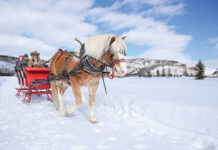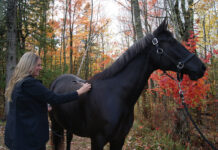
Being a grazing species, the more a horse is out on pasture, generally, the healthier he is. The chances of developing certain respiratory diseases, digestive issues, and behavioral problems can be drastically decreased with all-around turnout. However, the idyllic green pastures are not as innocuous as they may seem. Let’s take a look at a few health problems specific to horses housed outdoors.
The constant manure contamination of a pasture by multiple horses inevitably leads to internal parasite transmission. Adult parasites in the horse’s digestive tract, such as strongyles, roundworms and tapeworms, produce eggs that are shed in the feces and then ingested by other horses grazing nearby, thereby perpetuating the parasite life cycle. The more horses on a particular pasture, the greater the contamination and transmission, potentially leading to health problems such as weight loss, diarrhea, and sometimes increasing the chance of colic.
There are numerous deworming drugs (also called anthelmintics) on the market for horses, but implementing proper pasture management is just as important, as this will help slow the development of resistance on your farm. Ideally, pastures should be cleaned of manure on a regular basis. However, this is extremely labor intensive and often not realistic on many farms. Another option is to drag the pasture during hot, dry summer months. This will help spread out manure piles to dry in the sun, killing parasite eggs.
Avoiding over-grazing of the pasture is also important. When horses over-graze the grass and get too close to the ground, they are more likely to come into contact with parasite eggs.
Not all horses carry the same number of parasites despite living on the same pasture. In fact, on average, 20% of the horses on a pasture will shed 80% of the parasite eggs. Finding those “high-shedders” and deworming them regularly will help decrease the numbers of eggs on the pasture. Have your veterinarian perform fecal egg counts on the horses on your pasture to determine each individual’s worm burden. The remaining horses may only require deworming a couple of times a year.
Laminitis
Laminitis, commonly known as founder, is an extremely painful inflammation of the sensitive tissue inside a horse’s hoof, called the laminae. Laminitis is debilitating and its complications can lead to euthanasia in extreme cases. There are many potential causes of this condition, but one of the most common causes is ingestion of large amounts of rich grass that is heavy in sugary carbohydrates. This primarily occurs during the spring and fall after heavy rains and subsequent rapid vegetative growth.
The key to laminitis prevention for pasture-based horses is to limit their intake of lush grass at first, and then slowly increase exposure. Using electric fencing and implementing strip grazing during peak growth times can help control a pastured horse’s grass intake. Grazing muzzles can also be used to restrict grass intake. Such measures will also help prevent weight gain of pastured horses during the same time.
Exposure to the elements
Although the exposure to constant fresh air is extremely beneficial to a horse’s respiratory system, exposure to the elements also potentially brings some negative effects. During excessively wet weather, such as in the early spring and throughout winter, certain skin conditions are commonly seen in pastured horses. Horses constantly standing in thick mud or wet grass are at increased risk of developing mud fever, also known as scratches or pastern dermatitis. Although usually fairly benign, this scabby skin condition on the back side of the pastern can become a chronic problem and is difficult to treat effectively if the horse does not have a dry place to stand.
Dryness is also required for proper treatment for another skin condition called rain rot, also known as rain scald. This condition is seen when horses are chronically wet, predisposing them to an overgrowth of skin bacteria, generally seen clinically as characteristic clumping of the hair along the back and on the rump.
Sun exposure can also be an issue for some horses, especially those with light colors such as grays, light palominos, and cremellos, and those that lack pigment on their noses. Higher elevations may exacerbate solar skin damage. Sunburn can be prevented by regular application of zinc oxide to the affected area; any child-safe sunscreen will do.
Insect Hypersensitivity
The summer months bring bugs, a constant source of irritation to many horses, especially those kept on pasture. Stable flies, black flies, horse flies, mosquitoes, gnats, and “no-see-ums” not only cause potential local irritation to the skin, but can also transmit diseases including West Nile Virus and Eastern and Western Equine Encephalitis. Some horses can be hypersensitive to insect bites in the summer months, potentially suffering from hives and itchy skin. Manes and tails rubbed bare and other patches of skin itched raw can make these horses miserable in the field.
Proper manure management will decrease the amount of biting insects. Strategic placement of the manure pile away from any pastures will help prevent congregations of insects in the field. Through application of fly spray containing pyrethrins will also help. Flysheets for the most sensitive horses may help by providing a lightweight physical barrier between skin and insect. Reducing the amount of standing water in a pasture will also help decrease biting insects in the field. Small, low-lying drainage areas and tepid ponds are ideal breeding places for mosquitoes and biting midges.
The benefits of fresh air, exercise, and constant grazing far outweigh the various health problems specific to pastured horses. With the right management tools and awareness of potential pasture pitfalls, your horse should be able to enjoy the great outdoors with minimal hassle.
Back to all course materials >>





The last paragraph says it all. The benefits far outweigh the deficits of keeping horses outdoors. And with the proper management most will never have to deal with these issues.